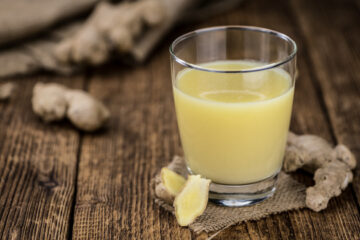As the winter drags on and the festive period ends, you may be wondering whether there’s a whole lot you can do to try and make the colder months that bit more enjoyable. Well, did you know that what we eat can have a significant impact on our mood? Eat the right foods, and you may increase those happy, energised feelings to keep you on top form until sunny Spring swings round again.
And believe it or not, Veganuary might just hold the answer. Vegetarians who avoid animal products tend to feel less anxious, stressed and depressed than even healthy meat eaters (1). Not only that, but if you put meat eaters on a plant-based diet for just two weeks, their mood scores improve significantly compared to those who don’t change their diet at all (2). So with that in mind, which plant foods can be particularly beneficial? Are there any real heavy hitters? Let’s dive in.
1. Blueberries
Eating more fruits and vegetables has been linked with significantly improved well-being (3, 4). In fact, one study found that increasing fruit and veg intake by 8 portions a day gave the same improvement in life satisfaction as going from unemployed to employed (5), while another found that eating more fruits and veg (from as little as 3 times per week) could cut one’s odds of depression by more than half (6). That’s quite the improvement!
Blueberries may be particularly beneficial. Not only do they support the immune system and reduce inflammation with their high antioxidant levels (7), they can also boost your mood! As little as 30 grams of blueberries can increase your mood significantly just two hours after consumption (8, 9). Children and young adults who consume blueberries report significantly improved positive mood compared to those who don’t. So if you’re feeling blue, get on the blueberries!
2. Tomatoes
There has long been a link established between an increased intake of antioxidants and improved mental health outcomes. One particularly powerful antioxidant is lycopene (up to 100 times more efficient than vitamin E (10)), which the majority of us consume primarily through tomatoes (11). Those who consume a more tomato-rich diet demonstrate a lower prevalence of depressive symptoms, suggesting that eating tomatoes might have a significant positive impact on mood (12, 13). This is one fruit (or vegetable?) that you’ll want to cook, however, as lycopene concentrations increase by up to 5 times in cooked versus raw tomato (14)!
3. Dark green leafy vegetables
Of course, dark green leafy veg had to be included on the list. Watercress, chard, spinach and kale are among the most nutrient-dense foods on the planet (15), and they also appear to protect against low mood (13). But how do they do this? The answer: folate. Low folate levels have been associated with lower mood and more depressive symptoms (16). Increase folate intake, however, and depressive symptoms significantly drop (17). So no excuses, add some leaves to your next meal and feel the full force of greens!
4. Seeds
Serotonin, dubbed the ‘feel-good hormone’, is present in a wide range of plant foods. So if serotonin makes us feel good, surely we can just eat more of it and feel great, right?! Unfortunately, wrong. When consumed, serotonin cannot cross the blood-brain barrier, so no matter how much we ingest, it won’t make it up to our brain where we could otherwise reap the benefits.
The amino acid tryptophan, however, does. Tryptophan is the precursor to serotonin – meaning our bodies make serotonin from tryptophan (18). Boost this, and our bodies can produce more serotonin. The best sources of tryptophan are not only those containing plenty of it, but that also have a high tryptophan to total protein ratio (19). And the best foods for this are… You guessed it, seeds! Sesame, sunflower, pumpkin, you name it. In a study on global mood among vegetarians with restricted consumption of dairy and eggs, and meat-eaters, it’s thought that tryptophan is the reason why global mood among veggies was significantly better within just three weeks of adopting the diet (20). Remarkably, seeds may even be able to help those suffering with social anxiety (21) – so hopefully the seed has now been sown. Eat up, pumpkin!
5. Turmeric
Turmeric has well and truly earned its reputation as a power-house spice. In addition to antioxidant and anti-inflammatory properties, curcumin (the active compound in turmeric) possesses anticarcinogenic, antiviral, and antifungal properties that have been recognised and used since 1900BC to treat various illnesses (22). You’d almost expect it to be able to hang out your washing! As if all this wasn’t enough, it turns out turmeric can also make you happy. Or rather, less likely to be unhappy (23).
Low levels of the molecule brain-derived neurotrophic factor (BDNF) have been linked to the shrinking of certain parts of the brain linked to depression (24), suggesting that BDNF may play a key role in depression. On the flip side, boost BDNF and the risk of depression decreases. Queue… curcumin! Or, in its whole form, turmeric. A teaspoon a day of turmeric can boost BDNF by more than 50% over the course of a month (25). Side effects include increased alertness alongside the host of other benefits listed above. What’s not to love?!
6. Nuts
Nuts are yet another great food source for boosting BDNF levels. Those with regular consumption of nuts had a 78% lower chance of having low levels of BDNF (26). Like seeds, they’re also an excellent source of tryptophan. So in a nutshell – be sure to add nuts to your diet!
7. Green tea
Green tea consumption has been linked to lower levels of depression. Indeed, those who drink over 4 cups a day (granted, this is quite a lot) experience a 44% lower prevalence of depressive symptoms (27). It’s thought that the compound Epigallocatechin gallate (EGCG) plays a role in inhibiting the expression of monoamine oxidase (MAO) – an enzyme which has long been considered to play a major role in depression.
8. Nutritional yeast
Here’s one for the athletes among us! Nutritional yeast, or yeast flakes, are cheesy-tasting flakes of inactive yeast often used to make vegan cheese sauces, or to add a punch of umami to dishes. They’re extremely high in a type of fibre called beta-glucans which boost recovery and, importantly, mood, after intense exercise.
Following heavy endurance events such as marathons, participants tend to experience both a drop in their immune system’s defences (28) and their mood (29). Feed them a daily supplement of beta glucans (equivalent to a spoonful of nutritional yeast), however, and not only does their risk of illness decrease significantly, their post-race blues aren’t so… blue. Those taking the supplement reported significantly less fatigue, increased vigour, and a better global mood state (30). So if you’re training hard or have an event coming up, nutritional yeast has your back!
So if you’re going the whole (vegan) hog and sticking to just plants this January, or even if you are looking to up your plant food intake, try incorporating some of these mood-boosting foods into your routine and watch January breeze by without so much as a stir. If you’d like more information on vegan diets and how to boost mood, be sure to get in touch and we’ll be happy to help.
By Richard Trevor, revised by Reema Patel, registered dietitian and plant-based expert at Dietitian Fit.







